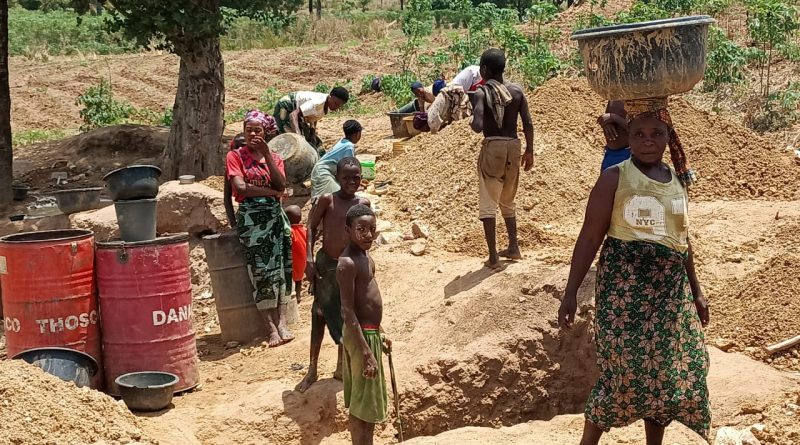Women, Mining, And The Hidden Cost Of Survival In Galle, Nassarawa Eggon
By Esther Enna
Mining remains one of the major economic activities sustaining the economy of Nasarawa State and Nigeria at large. With vast deposits of minerals such as coal, limestone, and granite, the sector provides jobs, attracts investment, and supports local livelihoods. Yet, behind the glitter of these minerals lies a story of silent struggles, especially for women.

A visit to a mining site in Galle community, just a few kilometres from Nasarawa Eggon town, reveals the complex realities of life in mining zones. The trip, supported by Global Rights, an Abuja-based non-governmental organization, sheds light on the hidden challenges faced by women. Challenges ranging from exploitation and sexual abuse, to the breakdown of family structures have become common stories in this community.
The Other Side of Mining
While mining brings income and opportunities, it also leaves deep social and environmental scars. In many communities across Nasarawa State, the influx of migrants seeking fortune from the mineral-rich hills has stretched local resources and disrupted traditional values.
Women, in particular, find themselves navigating new risks, including sexual and gender-based violence (SGBV) and prostitution, as survival becomes more difficult.

When Radio Nigeria Precious FM Lafia visited the Galle mining site, it met a crowd of men and women chanting protest slogans such as “We no go gree!”, an expression of frustration over mounting restrictions and neglect.
A veteran miner, Mallam Abdullahi Haruna Onawo, explained that women are now banned from climbing the hill where drilling and excavation take place due to safety and security concerns.
“In the past, women were allowed to go up and collect precious sand to sell,” he said. “But they are now restricted because of the risks of exploitation and insecurity. Sadly, some women have lost respect for their homes, and some men take advantage of them sexually.”
Mallam Onawo, however, noted that the engagement of youths in mining has reduced incidents of robbery and insecurity in the area. He appealed to the State Government not to hand over mining sites to foreign operators, insisting that doing so would deprive locals of economic opportunities.
Broken Homes a Consequence of Economic Opportunities?
For some women, the mining site has become both a workplace and a source of heartbreak.
Mrs. Bara’atu Adamu, a 35-year-old mother of two, admitted that her marriage ended after she began a relationship with a miner to support her children.

“My husband couldn’t provide for us,” she confessed. “I had no choice but to rely on my mining boyfriend who takes care of my needs. I don’t regret my decision because I’m doing better now.”
In contrast, Grace James, a 30-year-old food vendor, shared her regrets. She said her husband left her after discovering her affair with a miner.
“I lost everything — my marriage, my family’s respect,” she lamented. “The man I cheated with abandoned me, and my parents disowned me. I want other women to learn from my mistake and be content with what they have.”
At the same site, Mrs. Mary Judge, a soft drink and snack seller, confirmed that many married women conceal their marital status to engage in transactional sex with miners in exchange for money and gifts.
Government and NGO Responses
When contacted for comments, the Director of Women Affairs, Mrs. Fatima Danladi, said the Ministry of Women Affairs and Humanitarian Services has ongoing empowerment programmes aimed at improving women’s livelihoods across the State.

She urged women to take advantage of these opportunities rather than resort to risky lifestyles.
“The Ministry will not relent in its efforts to protect and support women and children,” Mrs. Danladi assured.
Similarly, the Commissioner for Environment and Natural Resources, Princess Margaret Elayo, expressed concern over reports of women engaging in sexual relationships at mining sites. She said her ministry is working to promote women’s welfare and sustainable community development.
The Executive Director of Global Rights, Mrs. Abiodun Bayeiwu, called for collective action to end the exploitation of women in mining communities.
“We must build a society where justice, equality, and dignity are realities for all women,” she said. “Global Rights remains committed to ensuring that the rights of women and children in these communities are protected.”
A Call for Inclusive Mining Policies
As Nasarawa State continues to harness its mineral wealth, stakeholders agree that the welfare and dignity of local communities — especially women —must not be sacrificed for profit.
Mining may be an engine of growth, but without safeguards, it risks deepening inequality and moral decay.
The story from Galle community serves as a reminder: development must not only be measured in tonnes of minerals extracted, but in the wellbeing of the people who live around those mines.
Editor’s Note:
This report was adapted from a broadcast feature originally aired on Radio Nigeria Precious FM, Lafia, and written by Esther Enna. It has been edited and republished by Eggonnews to highlight the human impact of mining activities on women in Nasarawa State.





